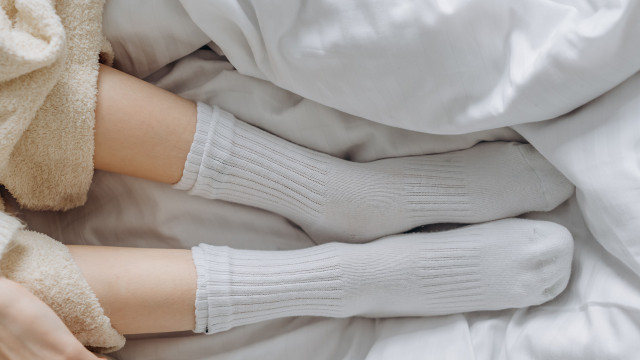
Opinions differ when it comes to the feel-good temperature for sleeping: some like it to be cozy and warm in the bedroom, while others love cold air – even in winter. The good news for all cold sleepers: cool temperatures in the bedroom save energy – and therefore money – and are good for your health. For the warm sleepers: good reasons not to heat the bedroom or only a little.
This winter, the question of the optimal bedroom temperature is not only about the individual feel-good temperature, but also about saving as much energy and money as possible. Leaving the heating on at night uses a lot of energy and is also bad for your health. We provide you with tips that your wallet and your health will be happy about.
4 reasons for cold bedrooms
#1: Save energy
So that the electricity bill is not too high this winter, many people in Germany are thinking about where energy can be saved. The savings potential is great in the bedroom:
- If you leave the blinds or shutters down during the day, you can reduce heat loss through the windows by up to 40 percent, depending on the window in question.
- Curtains can also help save energy.
- If you ventilate the bedroom properly, you save a lot of energy:
#2: Better sleep quality & plus for the metabolism
In general, we sleep more deeply and calmly at lower temperatures than at higher ones. In addition: “If we sleep at higher temperatures, our body’s repair mode no longer works so well,” explains sleep coach Christine Lenz. “A cool temperature in the bedroom ensures that nightly regeneration works better”. Cold boosts metabolism, showing the effectiveness of ice baths and cold therapy used for certain medical conditions.
#3: Fewer headaches
On average, a person loses about 500 ml of fluid during the night. If it is also warm in the bedroom, the loss of fluid is even higher. This can lead to headaches. In general, a bad room climate, ie too little oxygen, too dry air and pollutants in the room air, can also cause headaches.
#4: Dry air weakens the immune system
If you heat up, this automatically leads to dry air, the mucous membranes of the nose dry out. If the mucous membranes are not sufficiently supplied with liquid, pathogens have an easier time and can multiply better.
Therefore: If you have trouble falling asleep or restless sleep, it could be because it is just too warm in your bedroom. The right temperature in the bedroom can improve the quality of sleep.
Also exciting: Self-experiment cold showers: My conclusion after 5 months
Temperature in the bedroom: cool does not mean cold
Even if we sleep better when it’s cool: Temperatures that are too low are not healthy either.
- If the rooms cool down too much, moisture collects on the walls, which can lead to the formation of mould.
- If it is too cold, the body’s immune system is activated and runs at full speed. This in turn disrupts sleep.
- And: If we cool down due to the low temperatures, the risk of getting sick increases.

Bedroom temperature: what is the optimal sleeping temperature?
“The” optimal temperature for sleeping does not exist. Doctors agree, however, that it should be between 16 and 19 degrees. Sleep expert Christine Lenz believes that the bedroom can be a little cooler than 16 degrees. “Cold temperatures when sleeping have health benefits: the body regenerates better, we sleep more peacefully.” The important thing here is: “The body, especially the extremities, must not cool down. That’s why I recommend my patients to go to bed in socks, a scarf and a hat.”
The consumer advice center advises: “Even in rooms that are rarely used, the temperature should not drop below 14 to 16 °C, otherwise moisture will condense”.
Ultimately, the optimal sleeping temperature depends on individual preferences – and the thickness of your duvet. You should neither freeze nor sweat at night. Older people often prefer a warmer room temperature in the bedroom than younger people. Regardless of whether you prefer to sleep a little colder or warmer: fresh air is important!
Tips to help you sleep well and healthily in the cold
- Falling asleep works extremely badly with cold feet. A warm foot bath before bed helps.
- A hot-water bottle left in bed ten minutes before going to bed also provides cozy warmth.
- A duvet that suits you. Here you will find 6 recommended natural blankets:
Humidity in the bedroom in view
The relative humidity indoors – and therefore also in the bedroom – should be between 40 and 60 percent. The consumer advisory service explains: “Mould can grow directly on a wall at a relative humidity of around 70 to 80 percent. For this, the wall does not have to feel damp, nor does condensation have to be visible. This only happens at a relative humidity of 100 percent.”
The humidity in the room can be easily checked with a thermo-hygrometer, which can be bought at a hardware store for a few euros.
Tips for airing at night
Even if we at Techzle.com generally recommend forced ventilation or cross ventilation: At night, a tilted window can help to reduce the humidity in the room. Especially if you have roller shutters that can be closed except for a few open slits.
Make sure there is no draft at night. Drafts can lead to a cold or a strained or stiff neck.
Read more on Techzle.com:
- Does freezing make you sick or does it harden you?
- Ventilate properly: 12 tips against mold in the apartment
- Cold hands: causes and how to warm them up sustainably